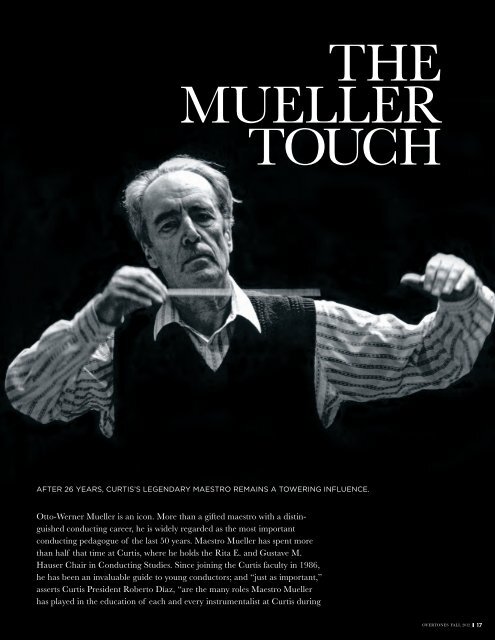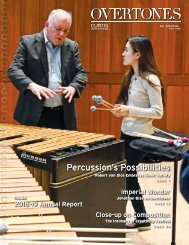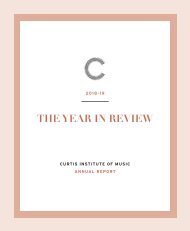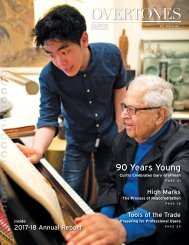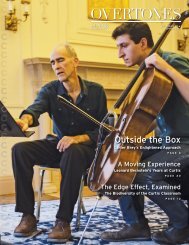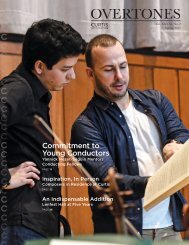The Mueller Touch
After 26 years, Curtis's legendary maestro remains a towering influence.
After 26 years, Curtis's legendary maestro remains a towering influence.
Create successful ePaper yourself
Turn your PDF publications into a flip-book with our unique Google optimized e-Paper software.
THE<br />
MUELLER<br />
TOUCH<br />
AFTER 26 YEARS, CURTIS’S LEGENDARY MAESTRO REMAINS A TOWERING INFLUENCE.<br />
Otto-Werner <strong>Mueller</strong> is an icon. More than a gifted maestro with a distinguished<br />
conducting career, he is widely regarded as the most important<br />
conducting pedagogue of the last 50 years. Maestro <strong>Mueller</strong> has spent more<br />
than half that time at Curtis, where he holds the Rita E. and Gustave M.<br />
Hauser Chair in Conducting Studies. Since joining the Curtis faculty in 1986,<br />
he has been an invaluable guide to young conductors; and “just as important,”<br />
asserts Curtis President Roberto Díaz, “are the many roles Maestro <strong>Mueller</strong><br />
has played in the education of each and every instrumentalist at Curtis during<br />
OVERTONES FALL 2012<br />
17
this time: theory instructor, music historian, and phrasing supervisor, just to name a few.” A<br />
<strong>Mueller</strong> rehearsal is a revelation, uncovering a world of intricate detail in well-known scores.<br />
At Commencement last May, as Maestro <strong>Mueller</strong> retired from full-time teaching, Curtis<br />
awarded him an honorary doctorate. <strong>The</strong> tribute recognized his enormous influence on<br />
young musicians over a tenure of 26 years—and counting—as well as at other institutions<br />
including Yale, Juilliard, and the University of Wisconsin. Congratulations flowed in, including<br />
this student reminiscence from the appreciative president of a certain New York conservatory:<br />
“I believe that I was the first person you corrected from the podium at the beginning of<br />
your tenure at Yale,” wrote Joseph W. Polisi in a letter to the honoree. “You were upset that<br />
I was playing too loudly at the upbeat to the second measure of the Shostakovich First<br />
Symphony. I understood when you said, ‘We know what a bassoon sounds like.’” Current<br />
and graduating students likewise shared their memories and impersonations of their<br />
beloved teacher and guide. Overtones offers its own tribute to Maestro <strong>Mueller</strong> here.<br />
“<strong>The</strong> worst insult a conductor can give<br />
the orchestra is to not be well prepared.<br />
A conductor must know every line and see<br />
the whole phrase, like the curve on a building.<br />
He must know what’s just ahead and where<br />
you are going, and communicate: eye<br />
contact is the most important thing.”<br />
Otto-Werner <strong>Mueller</strong> in Overtones, 2002<br />
18 OVERTONES FALL 2012
“Mr. <strong>Mueller</strong> instilled in each of us the utmost respect for<br />
the composer’s intentions, and made certain that we placed<br />
the importance of the score before our own passing musical<br />
whims. He opened our ears to a new level of detail, and<br />
insisted upon a devout care for every note, in both quality<br />
of sound and in its contextual placement. In my years since<br />
graduating from Curtis, I am discovering how rare these<br />
elements of music-making can be, and I am all the more<br />
grateful to have been part of such a privileged, but more<br />
importantly honest, community of music-making.”<br />
—Elena Urioste (Violin ’08)<br />
“My days at the Curtis Institute of Music were a turning point in my life. Up until age<br />
19, I lived in Peru, and knew very little about the music that I now love and perform.<br />
Otto-Werner <strong>Mueller</strong> changed that. As my teacher, he was very clear to point out what<br />
I didn’t know—and then he encouraged and taught me throughout my time as his<br />
student not only how to learn, but also how to enjoy the process of learning. He always<br />
said: ‘If you don’t know something, say that you don’t know it, and find the answer.’<br />
This advice has stayed with me ever since and informs how I work and live every day.”<br />
—Miguel Harth-Bedoya (Conducting ’91), music director, Fort Worth Symphony<br />
“In my first informal reading with Maestro <strong>Mueller</strong>, Brahms’s First Symphony was slated<br />
to be the vehicle that would indoctrinate all of us newbies into the Curtis Symphony<br />
Orchestra. As I think back, we must have all looked like frantic puppies—wary of the<br />
maestro’s wrath, but extremely eager to please. As is the typical <strong>Mueller</strong> way, our<br />
introduction to the work didn’t begin with a runthrough of the first movement. In fact,<br />
we didn’t even start at the beginning. Maestro <strong>Mueller</strong> dissected the symphony in<br />
agonizingly minute detail, highlighting figures in the winds, connecting lines between<br />
each string section, and jumping between movements to point out motives planted in<br />
the symphony’s skeleton. ... In the end, this microscopic work allowed us to put all the<br />
pieces back together to make it more beautiful and more profound than ever before.”<br />
—Benjamin Beilman (Violin ’12)<br />
“Otto Werner <strong>Mueller</strong> remains one of the most important<br />
influences I have had in my musical development. My years<br />
studying with him were crucial and I literally think about<br />
things he taught me every day. Thank you, Mr. <strong>Mueller</strong>, for<br />
all you gave to me and all your other students, and for<br />
what you stand for as a musician and human being.”<br />
—Alan Gilbert (Conducting ’92), music director, New York Philharmonic<br />
Opposite page top: Maestro <strong>Mueller</strong> with his wife, Virginia Allen,<br />
at Wednesday Tea PHOTO: PETE CHECCHIA<br />
Opposite page middle: Maestro <strong>Mueller</strong> conducts the Curtis Symphony<br />
Orchestra in 1994. PHOTO: JEAN BRUBAKER<br />
Opposite page bottom: Maestro <strong>Mueller</strong> received a hearty standing<br />
ovation at Curtis’s Commencement in May. PHOTO: DAVID SWANSON<br />
Above top: Maestro <strong>Mueller</strong> chats with Robert Spano (Conducting ’85)<br />
following a Curtis Symphony Orchestra rehearsal. PHOTO: CANDACE DICARLO<br />
Above middle: Maestro <strong>Mueller</strong> in a Lab Orchestra rehearsal<br />
Right: Maestro <strong>Mueller</strong> and pianist Leon Fleisher after a Curtis Symphony<br />
Orchestra performance in 2003. PHOTO: PETE CHECCHIA<br />
More Online<br />
Share your memories of Maestro <strong>Mueller</strong><br />
on the Curtis Facebook page<br />
www.facebook.com/CurtisInstitute<br />
OVERTONES FALL 2012<br />
19


